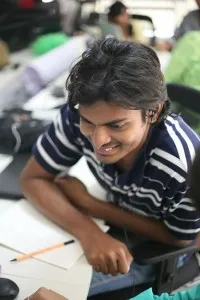[Techie Tuesdays] B. Indraneel - From mechanical engineer to becoming Layar's first engineer
Layar browser was one of those apps I knew that always existed, but didn't know what to do with. Augmented reality hadn't hit India as yet and there was no use for it in the early days. Later on, when I understood what AR was, I was blown away by the potential that it presented.
Today's Techie Tuesday, B. Indraneel, was Layar's first software engineer. I've been acquainted with Indraneel for about a year through various forums and meetups that we were a part of, where he is popularly known as a top notch freelancer and and the founder of education startup, Divi.
As with many Techie Tuesdays that we've covered in the past, I'm beginning to believe that non CS grads make better coders, and Indraneel is one more sample to contributing to the hypothesis. But, despite this consideration, his feats as a software engineer are tremendous, for he never really wanted to be a computer engineer from a young age.

So how did this mechanical engineer from IIT Kharagpur go on to become a computer wizard? Well, that's the story -
Liked computers, but never really wanted to be a coder
Indraneel's understanding of computers comes from early exposure. When he was 13-years-old, a Pentium 386 would be his gateway to the world of computers. He says, "There were a few computer books lying around at home, and I used to pick them up and try and learn. I tried my hand with FoxPro, which I thought was quite useful. For those who start with C, you're only writing code that executes. Now, FoxPro was a DBMS, and we could create products that end users use with it, which I wouldn't have got had I learnt C first."
Of course, he'd later go on to learn C, which he used extensively through college. But not as a computer science engineer, but a mechanical engineer.
The lure of creating experiences
It was internship time at IIT Kharagpur, and Indraneel was exposed to the reality of the opportunities available to a mechanical engineer. He says, "I mean, there was a lot to learn, but it was a slow industry, and to grow and acquire expertise in it was going to take a lot of time. Also, to make a change at an early stage was going to be very difficult in this space."

In this time, he also developed an interest in building applications for smartphones, which he did as a part-time job as a software coder for an IIT Kharagpur startup. But the final nail in the coffin for his mechanical engineering career was hammered by his product design professor. Indraneel shared, "The professor was quite progressive and he used to teach us about the current things that were happening in the Industry. He also said that in other fields, you're mostly building products that perform a function, but with software, you were creating an experience. I related to that and, looking back, I don't see myself anywhere else than where I am now."Smartphone romance and the freelance plunge
Indraneel took his college placements and got placed at FICO, where he would spend a few years. In this time, iOS and Android were just coming into the market and Indraneel was one of its early adopters. He says, "I picked Android because iOS asked for a 200 USD fee to sign up as a developer, which obviously wasn't a great thing early on! But I've been working on the Android platform since its developer preview days. I even took part in the first Android developer contest, where I collaborated with teammates from around the world to submit an entry. While what we submitted wasn't a compelling enough product, I got acquainted with the platform and started contributing actively on online forums."
These contributions caught the eye of many in the then nascent Android community and Indraneel was referred to for an Android project. He says, "That project happened to be from the founders of Layar, the augmented reality browser. Along with me there was one other Chinese developer, who left within a month. I stuck on. I was really passionate about what we were working on, and knowing that millions of users use the app was a great feeling for me."
Layar and beyond
Indraneel worked extensively with Layar and has seen much of its initial stages and up to post funding. He says, "I remember, after funding, Layar struck a deal with Samsung, where they would pre-bundle the app with their Galaxy series. I saw that banner in Bangalore and it really was a great moment for me." Indraneel also shared Layar wanted to hire him on a full-time basis, which would require him to move to Amsterdam, which he didn't like very much. He says, "I don't like the idea of becoming an NRI!"
However, he did go to Amsterdam for Layar's first-year celebration. He says, "It was a very fun trip. I did so many different activities there (like skydiving). Furthermore, it was 2010 and Netherlands had made to the finals of the Football World Cup, so it was celebration all around. But you know, at Layar, the people who worked there considered it to be a job. As a freelancer, I was more passionate about the product than them. So, I eventually came back, to take up more freelance assignments."
He shared that all of his freelance work came to him through word of mouth and references because of his work with companies like Layar; and, until last year, he was a full-time freelancer.
What it means to be a freelancer
Indraneel is well aware of the reputation of freelancers in the software industry. He says, "I made a conscious attempt to make sure my clients were always happy at the end of my assignments and I've never compromised on that, even if it means returning the client's money."
Having hired a few freelancers himself, Indraneel believes that the majority of them don't take ownership of the project they sign up for and they don't stick to a commitment. He says, "Never make an estimate if you're not sure. Often times, what happens is that freelancers give a short estimate and when the work takes up more than the estimated time, you lose motivation to deliver the product. And, in any aspect of life, you are valued for keeping up your commitments."
Indraneel concluded by sharing that there is a demand for trustworthy freelancers.
He stopped taking up freelancer engagements to focus on his startup, Divi, which is another story. Stay tuned for all that and more!
Get in touch with Indraneel on Twitter.


![[Techie Tuesdays] B. Indraneel - From mechanical engineer to becoming Layar's first engineer](https://images.yourstory.com/cs/wordpress/2013/08/Indra1-200x300.jpg?mode=crop&crop=faces&ar=16%3A9&format=auto&w=1920&q=75)




